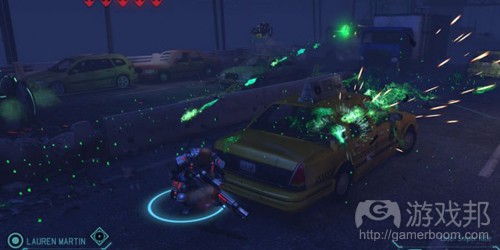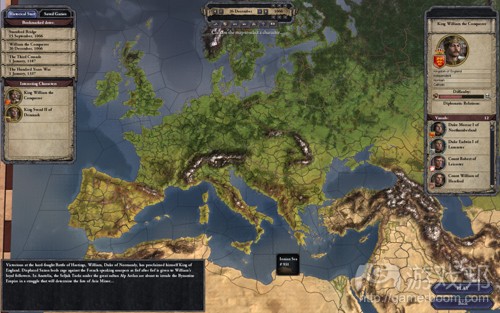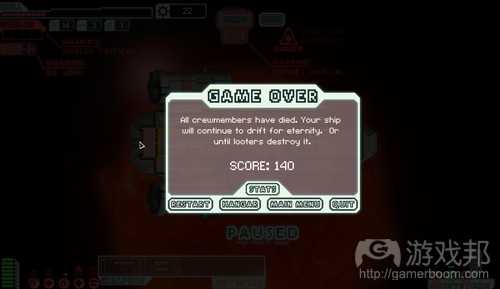从2012年总结策略游戏的4大发展趋势
作者:Mark Slabinski
对于策略游戏的忠实玩家们来说,2012年实在是一个福音年。从资深游戏迷到初次接触的新手,都能找到自己中意的好策略游戏。正当有些人质疑策略游戏,特别是回合制策略游戏的水平是否卡死在点击冒险游戏(我必须提出,一定程度上这类游戏也复兴了)的程度上,这些优秀的策略游戏的出现无疑解了燃眉之急,这才是最令人惊喜的。
与我写的关于创作和流状态设计的文章一样,本文是我的研究努力的结晶。有些想法比较复杂,但愿把它们写下来有助于解决问题。
言归正传,以下是我从去年玩的策略游戏中发现的趋势:
1、系统导向的道德选择正在增加
Anthony Burch杜撰了“系统导向的选择”这个词组,我认为它与策略游戏的关系可以追溯到《奇迹时代》(游戏邦注:是一款由Triumph Studios公司于1999年制作的回合制策略游戏)。
在策略游戏中,士兵的死亡一般不太让我产生同情心。毕竟他们没有人格,可以源源不断地产生并奔向我在地图上点击的地方,他们的价值与漫天飞舞的纸片没什么区别。然而,在《XCOM》中,我却为我的小士兵们担心受怕,其程度超过我玩过的任何AAA动作游戏或具有70个小时剧情连贯感人的RPG。
系统导向的选择意味着,道德选择不是由故事决定的,并且游戏中不存在非黑即白的选项;事实上,玩家无法在游戏中找到任何一种道德系统。相反地,道德选择是玩家扮演这些士兵的首领而产生的结果。如果你扮演的角色的行动可能导致你的一名部下死亡,但那么做可以让你以破记录的速度完成任务,你会怎么做?如果你的部下死亡了,那是你的选择导致的,其效果取决于你对那个单位投入的感情。
《XCOM》安排了各种小把戏让你对这些单位产生的感情超过《星际争霸》中的普通的太空舰队,但都可以归结为持续性和自定义。你可以重命名单位、自定义他们的外观特征、给他们升级技能。因为培养这些单位是持续消耗时间的,所以损失他们的风险很真实。在培养对单位的感情时,自定义是最有效的手段。
而《十字军之王2》让我意识到原来我自己竟然可以变得这么冷酷无情。它使用系统选择的方式与《XCOM》大大相反。你可以预见非常遥远的事,所以在为这些事制定计划时,你遇上了道德困境。
在游戏中,屠杀孩子的命令变成了一种普通的娱乐手段。国王的侄子破坏了我的继承顺序?抱歉了孩子,谁让你在错误的时间里出生在错误的家庭中。这款游戏中充满引诱、欺骗和为了给自己怕家庭争夺荣耀而发起战争。我目睹一整代血统的灭绝,和家族分支因为威胁到继承权而惨遭灭门。
《十字军之王2》的魅力在于,让你变成不择手段的统治者。当你置身于难以抉择的处境时,你就面临系统导向的选择了。游戏让你做出对人民非常残酷的选择,你自己就是唯一的道德裁判。退一步说,你做了所有帮你实现野心和抱负的事情,都在拷问你这一切是否值得。
对于一款玩家的绝大部分时间花在翻看菜单选项的游戏,这是一个令人惊艳的壮举,我认为未来还将有更多游戏效仿。我也觉得,这意味着策略游戏的设计越来越积极地向剧情导向迈进,这应该是让所有玩家都感到非常非常兴奋的事。
2、策略向相反方向前进
一方面,我们看到策略游戏越来越向动作类型靠拢,另一方面,我们也看到老式硬核策略游戏的回归。这类游戏的受众始终是存在的,无论何时都不会消失。
策略的含意已经不是它曾经定义的样子了。《英雄联盟》与《DOTA2》的崛起和《帝国时代OL》与《Fall of Nations》的衰落都让发行商和开发意识到玩家的真正需求已经改变了。现在,多人在线竞技游戏(MOBA)统治了在线领域,且短时间内不会改变,但谁能指责它们呢?既然这些游戏容易上手,且有庞大的忠实粉丝群体。为什么你不开发这类游戏呢?
但是,想想《FTL》这类游戏。这款游戏的世界基本就是俄勒冈小道(游戏邦注:这是美国西进运动中的重要通道)再稍作修饰。《无尽空间》、《XCOM》、《十字军之王》等都是以老式经典游戏的模式为基础。而在2012年,我们看到《混沌》发布重制版(出自原版《XCOM》的设计师的另一款游戏)、《空地一体战》发布测试版、《魔法门之英雄无敌》等策略游戏通过融资网站kickstarter获得资助。Paradox正在为所有旗下游戏制作拓展包,传闻《XCOM》也将发布拓展包,大量策略游戏毫无疑问将在今年的E3展上亮相。显然,这些游戏的收益前景一片光明。“回合制”也终于摆脱污名。
所以,当前的局势就是,有许多游戏工作室正在制作MOBA,同时有不少游戏继承了2000年及以前的游戏衣钵。我有充分的证据认为,复杂的、慢节奏的单人游戏早已远离灭绝的困境。
3、玩家不排斥复杂度,但不满糟糕的界面
这一条虽然没有发起新革命,但许多策略游戏设计师一直将其奉为准则。
关于界面,Johan Andersson在最近的一次采访中提出:“界面优化在保持相同的复杂度的同时,增加了游戏的吸引力。因为新游戏以及其提供的自由度,我们可以从头开始设计界面。所以,我们正在想法改进界面,以满足新老玩家的需求。”
我玩的游戏越多,我就越理解良好的UI对游戏体验是多么重要。《XCOM》的UI很整洁,《十字军之王2》的UI比较复杂,但一旦摸清窍门,就容易多了。《FTL》一直以卓越的UI而闻名。做好UI似乎是显然易见的要求,但往往被忽略。如果你的游戏很有趣,确实能让玩家做他们想做的事,那就没有必要为了一些休闲玩家而“傻瓜化”游戏或者做一些不必要的让步。不应该为了让玩家更容易上手而在游戏玩法上有所妥协,游戏真正需要的中是一个清楚的UI。
4、失败是新乐趣
我惊喜地发现,在策略游戏领域,或者说是所有游戏领域中最近有了新走向。游戏对难度的强调达到前所未有的高度,在策略游戏中产生这股趋势尤其让人欣慰。到目前为止,我玩《FTL》大约15小时,只获胜两次。在15世纪的欧洲,我的Slabinski家族血统灭亡的时候比幸存的时候多。我不知道为什么,但有时看到计划失败比看到它生效更有意思。可能是因为计划量太大,但看到精心布置的计划和战术被敌人的攻击和霉运所打断,更让人觉得刺激。如果不知道失败的可能性很大,游戏就没有那么有趣了。
我们对小独立游戏(如《FTL》、《洞穴探险》、《火线迈阿密》、《VVVVV》)中的失败已经司空见惯了,但认为这种设计在策略游戏似乎无效,甚至导致玩家无法承受这么大的挫败感。然而出乎我们的意料,失败让游戏更加吸引玩家了。
就像国际象棋与《黑暗之魂》杂交。
结论
2012年是策略游戏的复兴年,现在我们面临的问题是,2013年是否可以充分利用这股势头。就像《街霸4》的第一次发行肩负着复兴格斗游戏的使命,现在,开发者和发行商的责任就是,推出高品质、创新的策略游戏,不要浪费了这种游戏重新获得的人气。到目前为止,发展势头保持良好,我们期待着看到今年的新成果。(本文为游戏邦/gamerboom.com编译,拒绝任何不保留版权的转载,如需转载请联系:游戏邦)
The 4 biggest lessons from the year in strategy gaming
by Mark Slabinski
2012 was a godsend for those suffering from the strategy game itch. Everyone from the strategy veteran to the genre neophyte had a breathtaking library of new releases that all showcased the very best that strategy has to offer. Most surprising was that this came at a time when some were wondering whether strategy, specifically turn-based strategy was on the verge of becoming a dead genre on the level of point and click adventures (which, I must point out, are also somewhat on the rise again).
Much like my article on writing and flow-centered design, this is meant as much to be a crystallizing effort as anything else. Some of these are difficult ideas, but hopefully writing them down can help with tackling them.
So, without further ado, here are my 4 biggest lessons from playing strategy games of last year:
1. Systemic Moral Choice is on the rise
A term coined by Anthony Burch, systemic choice is something that I’ve seen inklings of for a while in strategy games going all the way back to Age of Wonders.
I should not be this affected by the death of soldiers in a strategy game. They have no personality, constantly spout out that they’re “On their way” to what spot on the map I just clicked, and in general are about as memorable as a paper bag blowing in the wind. And yet, I have experienced more drama and tension and worry for my little soldiers in a game of XCOM than any AAA action title or 70 hour long RPG boasting about an emotional, connective story.
What systemic choice does is make it so that moral choices aren’t dictated by the story, there’s never any black and white system and, in fact, the game never recognizes any moral system of any kind. Rather, moral choices emerge as a result of your position as the commander of these units. If you’re placed into a position where you could risk one of your members getting killed, but doing so would allow you to finish the mission in record time, do you go for that move? If they die, it’s the result of a choice you made, the effectiveness of which is determined by how much of a connection you had to that particular unit.
XCOM has all kinds of little tricks it pulls to make you care more about these units than you would the average space marine unit from Starcraft, but the shortened answer is persistence and customization. You can rename units, customize their physical features, and watch them grow and learn new skills. Units are a time investment, the threat of losing them is very real, and the fact that you can customize them is astoundingly effective at making people
Crusader Kings II, on the other hand, made me realize just how much of a heartless, uncaring bastard I could be. Its use of systemic choice is quite the opposite of XCOM’s. You can see just about everything coming from a mile away, it’s in the planning that you find moral conflict.
It’s the kind of game where ordering the assassination of children becomes blase and commonplace. Nephew of the king mucking up my line of succession? Sorry kid, you were born to the wrong family in the wrong time. It’s a game of lying, cheating, waging petty wars for the sole purpose of attaining glory for your house. I’ve seen entire bloodlines eliminated, whole cadet branches of my family house wiped out because they suddenly presented the risk of succession crisis.
Crusader Kings II has this wonderful sense of making you feel like a Machiavellian ruler, and its best systemic choices emerge when you are presented with situations in which there is no easy answer. It presents you with the option to do terribly cruel things to people, and the only judge of morality is yourself. Stepping back, looking at all the things you’ve done to achieve greatness, it begs the question of whether it was all worth it.
This is an amazing feat for a game where the majority of you time is spent combing through menu tabs, and one that I feel will be replicated by more games in the future. I also think that this is the beginning of a trend in strategy game design to actively make their games more conducive to being story generating engines, which is something that everyone should be very, very excited about.
2. Strategy is moving in opposite directions
We’re seeing both an evolution towards more action-oriented strategy at the same time as older and more “hardcore” kinds types of strategy games are being brought back. There is an audience for this kind of strategy and they’re not going away anytime soon.
Strategy no longer means what it once did. The prominence of League of Legends and DOTA 2 and the recent failure of games like Age of Empires Online and Fall of Nations has led to a shift in what publishers and developers think people want. MOBAs now dominate the online space, there’s no getting around that, and who can blame them? These games are easy to get into, have a huge and dedicated community. Why would you develop anything else?
But then, think of a game like FTL. That game is literally The Oregon Trail with more features tacked on. Endless Space, XCOM, Crusader Kings, these are all games that were built on old, classic foundations. Just this year we’ve seen the announcement of a remake of Chaos (another title from the designer of the original XCOM), the beta release of AirLand Battle, Heroes of Might and Magic, as well as a few other strategy games that received funding through kickstarter. Expansions for all of Paradox’s games are on the way, a rumored expansion pack for XCOM, and the glut of strategy titles that will no doubt be unveiled at this year’s E3. Clearly, there is profit to be had in these titles. Turn-based is no longer a dirty term.
So on one hand we have every other studio under the sun pushing out MOBAs, and then we have games who are the spiritual successors to games from the early 2000s and before. I just find that fascinating, and solid proof that complex, slower paced single player experiences are far from dead.
3. Complexity doesn’t turn people away, bad interfaces do
While not a new revelation, it’s something that a lot of strategy developers have taken far too long to incorporate.
Johan Andersson had this to say about interfaces in a recent interview with Digitally Downloaded: “Improvements to your interface allow you to keep the same level of complexity while at the same time broadening the appeal. With a new a game and the freedom it offers we can start from square one with the interface. So we are looking to streamline the interface to help new and old players alike.
The more I play games, the more I understand just how critically important having a good UI is to having an enjoyable time. XCOM’s UI is slick and clean, CKII’s is deep, but quite easy to navigate once you get the hang of it. FTL might win the prize for best integrated UI of all time. It seems like such an intuitive idea, but often one that gets overlooked. If your game is fun and actually lets the players get to do what they want to do, then there’s no need to “dumb it down” for casual players or make concessions that they otherwise might not need to make. Gameplay vision doesn’t need to be compromised for the sake of making it easier to jump into when all it really needs is a clean interace.
4. Failing is the New Fun
I love the fact that this is now a trend in strategy gaming, and in fact gaming as a whole. Games are embracing difficulty like never before and it’s awesome to see it happen in strategy games. I’ve played FTL for about 15 hours now and have only beaten it twice. I’ve had more bloodlines of the family Slabinski perish than survive to the early 1400s in Europe. I don’t know why, but somehow seeing plans fall apart is more fun than seeing them work. Maybe it’s the amount of planning, but there’s something infinitely tense about seeing delicately laid plans and tactics just barely survive a barrage of enemies and misfortunes. Without the knowledge that failure is a very real possibility, things just get boring.
We’ve seen this a lot with smaller indie games (FTL, Spelunky, Hotline Miami, VVVVV), but seeing it in strategy games seems like it wouldn’t work and that the frustration would be too much for players to take. Yet all it does is make players come back for more
It’s like chess, if chess were crossed with Dark Souls.
Closing
2012 saw the rebirth of strategy, and now the question is whether 2013 can capitalize on the momentum. Much like the rebirth of the fighting game genre back when Street Fighter 4 first released, the onus is on the developers and the publishers to put out quality, innovative titles and not merely abuse strategy’s newfound popularity. 2013 has been pretty good so far, here’s to what else the year might bring.(source:gamasutra)











































 闽公网安备35020302001549号
闽公网安备35020302001549号